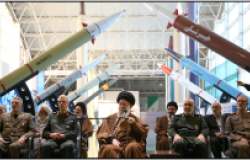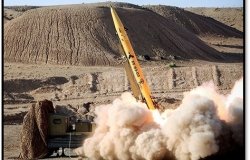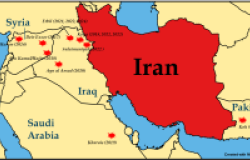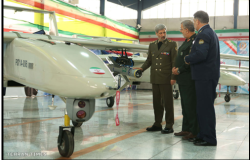Death, Taxes, and the Slow Destruction of Syria
Given this president’s core beliefs — and the circumstances in which he is operating — the “do something, but not a lot” approach in Syria was foreordained. And here’s why, in more or less Obama’s own words.
This week’s horrific attack by Syrian President Bashar al-Assad’s regime on Douma, a suburb of Damascus, which claimed the lives of at least 100 civilians and injured hundreds more, prompted me to review what role the Obama administration has played in the Syrian tragedy.
Let’s get the easy stuff out of the way first. The Syrian crisis has been an unmitigated disaster. Everything the liberal interventionists and neoconservative hawks have said about the consequences of not acting in Syria has materialized in bloody spades.
As for President Barack Obama’s administration, its critics charge not only that it has led from behind, but that it has also been missing in action. First, there was the invisible red-line episode, then the abortive “let’s train the Syrian opposition” fiasco, then “let’s deal with the Islamic State first,” and, oh, then we’ll get to Assad. By abdicating the field, Syria has become a moral, humanitarian, and strategic disaster for the United States. Upward of a quarter-million people have been killed; millions more uprooted and internally displaced. The catastrophe has opened the door to the rise of the Islamic State in Syria and likely created a situation in which pain, trauma, violence, sectarian killing, rape, slavery, torture, and 1,000 other plagues will be visited on this poor land for some time to come.
For those who level these charges and seek to shackle the administration with the ultimate responsibility for abetting this catastrophe, the question is what Washington could have done — or could do now — differently that might have averted these cruel circumstances and put the Syrian crisis on a better path.
It might have tried many things: no fly/drive zones; more U.S. leadership on the humanitarian and political track; military strikes against the Assad regime; a “surge” with U.S. boots on the ground in Iraq, or even in Syria, against the Islamic State; or a more serious effort to unify and train opposition forces. But these are now, sadly, hypotheticals.
Like death and taxes, it strikes me now, four years on, that there was then and remains now a certain inexorability and inevitability to the Obama administration’s — or at least the president’s — Syria policy.
Go ahead and judge the Obama administration for its failures, but while you do, keep in mind the president’s willingness to act, not just his capacity. Remember the place to start when analyzing U.S. policy toward the Middle East is not necessarily the Middle East; it’s the mindset of the head honcho. Given this president’s core beliefs — and the circumstances in which he is operating — the “do something, but not a lot” approach in Syria was foreordained. And here’s why, in more or less Obama’s own words.
I get America out of bad wars, not into new ones.
If you have any doubt that the president’s aversion to unnecessary conflict shapes his political and foreign-policy DNA, just look at the way he defends the Iran deal — comparing those who oppose it to those who supported the Iraq War. We know the president is a Star Trek fan; no wonder he follows the “prime directive” of nonintervention.
I need sustainable end-states.
The shadow of Iraq and Afghanistan represents another core belief of this president. Military force and power require an outcome commensurate with the sacrifice involved. Syria has appeared from the start as a trap in which an open-ended military commitment, for a stable end-state dependent on local and regional forces beyond America’s control and influence, threatened to stick the United States with a big check in lives, money, time, and resources.
In Syria and Iraq, the president has struggled to find a balance of intervention, a kind of rough mean between all in and not in at all. But from the halfhearted training of Syrian rebels to limited airstrikes, he clearly hasn’t found it. And yet it’s unlikely the president will go beyond these half steps — in Obama’s world, these problems don’t have military solutions. Force is necessary but not sufficient. Political changes are critical, and Obama likely believes to his core that the United States can’t produce them.
I want an Iran deal.
If there was any chance for a more muscular approach against Assad, it ended when the prospects of a historic deal with Iran on the nuclear issue came into view. There was just no way this president was going to militarize the U.S. role in Syria and risk a confrontation with Iran, or a proxy war, over Assad. Look, I can’t prove that’s the case (and my conversations with administration officials have led to strong denials that Iran had anything to do with avoiding a more muscular response in Syria), but you do the math. On one hand, there’s a chance for the United States to cut a deal to prevent a major Middle Eastern country from going nuclear — and you don’t have to actually use force; you can just talk. On the other hand, there’s wading into a messy, uncertain war on foreign soil where even the good guys don’t look so good.
I’m a counterterrorism guy, not a nation-builder.
The rise of the Islamic State in Syria and Iraq, with its gruesome and savage online theater, sealed the fate of any robust response. Stopping the Syrian state’s violence against its people, unseating Assad, and then rebuilding the country suddenly became a counterterrorism issue the president felt comfortable with. And the last thing he wanted was to enable the Islamic State’s rise by weakening Assad. The president knows that defeating the Islamic State requires a political solution in Damascus. But he’s not ready to take the lead in producing one.
Even with reports of discussions among the Russians, Iranians, Syrians, and Saudis, the chances for a deal that might ease Assad out don’t appear good. As far as it can be understood, the administration’s policy is to keep the Islamic State off balance, preempt an attack on the homeland, and work with Turkey and local allies in Syria and Iraq to take back territory and hold it.
Things can always change, of course. But short of a catastrophic attack on U.S. interests by the Islamic State or Assad (the former unlikely, the latter unwise), it’s hard to see how or why the president’s minimalist approach would be altered.
The president has willfully avoided seriously militarizing the U.S. role in Syria (and Iraq) for four years now. If you want a bold policy to save Syria, sorry: You’re going to need a different kind of president, a more risk-ready public and Congress, and frankly a better history of success in Iraq and Afghanistan. Beat up on Obama all you want for deserting Syria, and yell that we needed a real leader to show us how to save that forlorn place. But remember, as you wear out your voice, that neither the man, the times, the military, nor the country was even remotely ready for the job.
The opinion expressed here is solely that of the author.
About the Author


Middle East Program
The Wilson Center’s Middle East Program serves as a crucial resource for the policymaking community and beyond, providing analyses and research that helps inform US foreign policymaking, stimulates public debate, and expands knowledge about issues in the wider Middle East and North Africa (MENA) region. Read more










